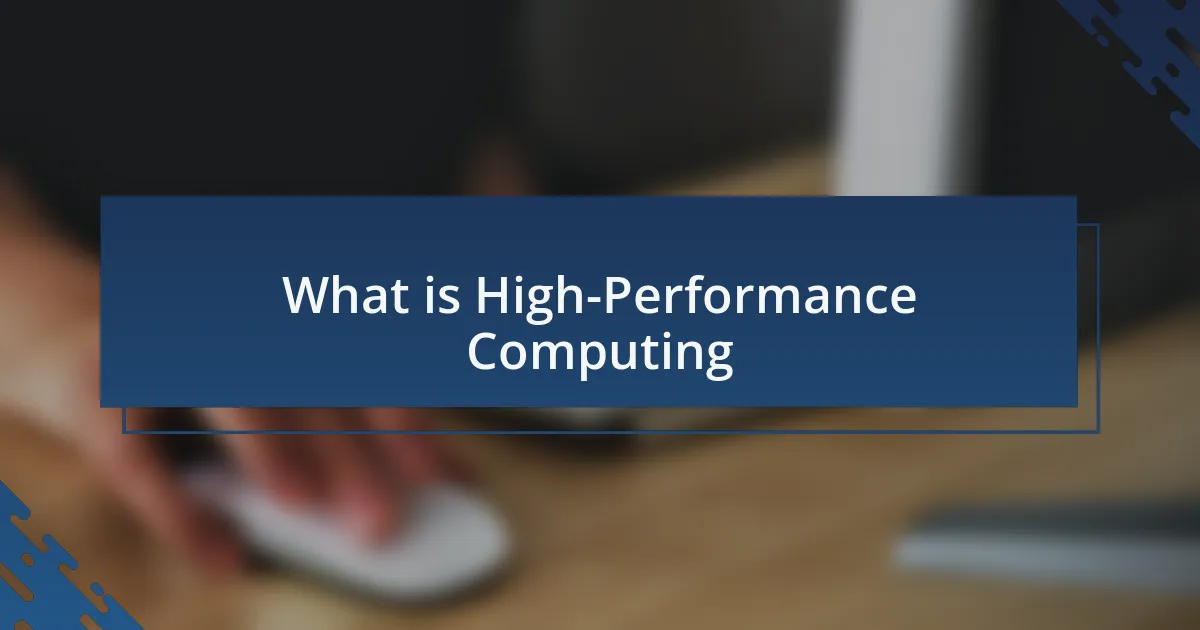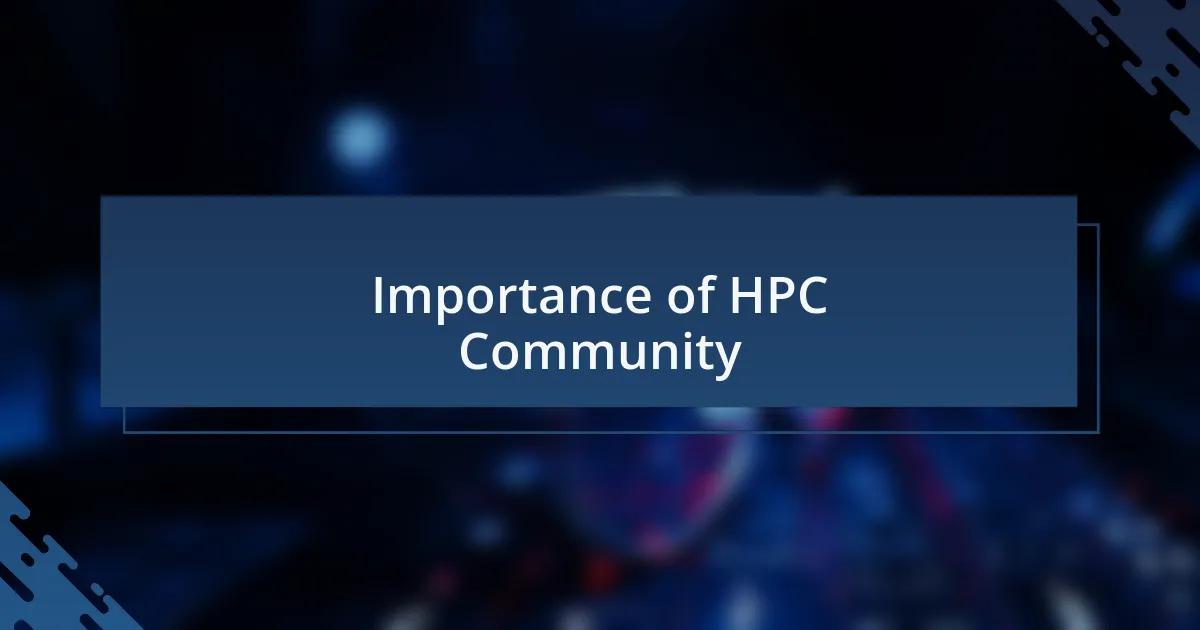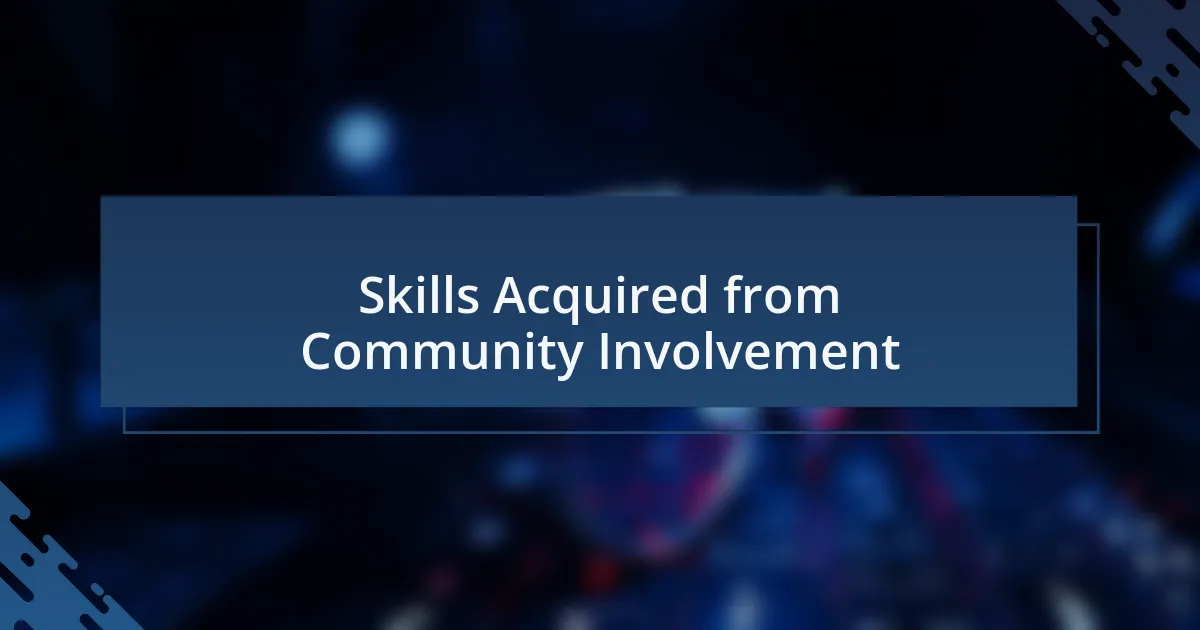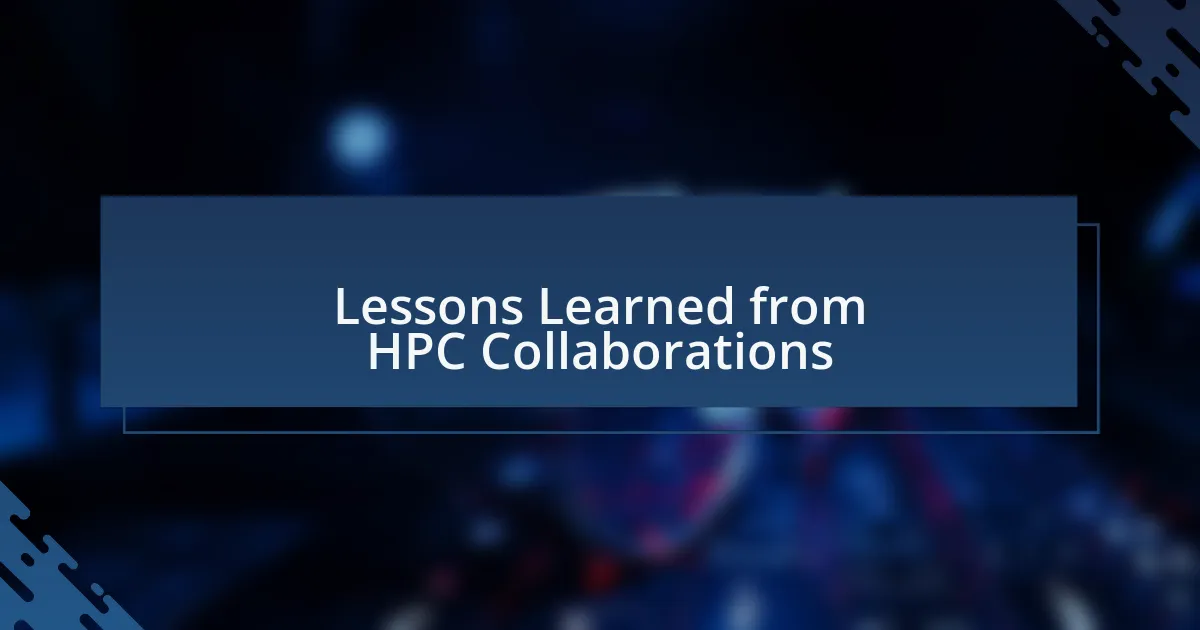Key takeaways:
- High-Performance Computing (HPC) enables the analysis of vast datasets, advancing fields like drug discovery and aerospace simulations.
- The HPC community thrives on collaboration, fostering innovation and professional growth through shared knowledge and mentorship.
- Developing skills such as communication, adaptability, and teamwork is enhanced through active involvement in the HPC community.
- Trust, diverse perspectives, and resilience are crucial lessons learned from collaborative experiences within HPC projects.

What is High-Performance Computing
High-Performance Computing, or HPC, refers to the use of powerful processors and systems to solve complex problems that require significant computational capability. I remember the first time I ran a simulation on a supercomputer; the sheer speed at which it processed data was both awe-inspiring and overwhelming. It made me realize that HPC isn’t just about raw power—it’s about unlocking new possibilities in fields like weather forecasting, molecular modeling, and complex financial predictions.
HPC systems are designed to handle vast amounts of data in parallel, allowing researchers to conduct analyses that would otherwise take years to perform on standard computers. I often wonder how many groundbreaking discoveries are made possible because of this technology. Just think about the impact: from accelerating drug discovery to enhancing aerospace simulations, HPC plays a pivotal role in advancing our understanding of the world around us.
As I delved deeper into the HPC community, I found that collaboration and shared knowledge are key drivers behind its evolution. Engaging with others who are just as passionate about these powerful technologies added a layer of excitement to my exploration. It truly struck me how HPC acts as a catalyst for innovation, pushing the boundaries of what we can achieve through computing.

Importance of HPC Community
The HPC community fosters a vibrant environment where knowledge-sharing is the norm rather than the exception. I recall attending a conference where experts presented their latest findings, and it was nearly contagious; I felt a rush of inspiration as I exchanged ideas over coffee breaks. This collaborative spirit not only accelerates innovation but also builds lasting relationships that extend beyond the conference walls. Have you ever experienced that spark of creativity when surrounded by passionate individuals? It’s truly transformative.
In my experience, being part of the HPC community provides unparalleled opportunities for professional growth. Whether it’s through open-source projects, forums, or mentorship programs, the support is immense. I remember collaborating on a project where I received guidance from someone whose work I had admired for years. That connection motivated me to push my work further, reminding me that when we come together, we can achieve so much more than we could alone.
Moreover, the HPC community plays a crucial role in navigating the ethical considerations of technology. I’ve often found myself pondering the responsibility we bear as developers and researchers. Engaging in discussions about issues like data privacy or the environmental impact of high-performance systems has made me more aware of the implications of my work. It’s heartening to be part of a group that doesn’t just advance technology but also strives to ensure it benefits society as a whole.

Skills Acquired from Community Involvement
Being actively involved in the HPC community has greatly sharpened my technical skills. I vividly remember a workshop where we dived deep into parallel programming models. As I struggled with a particularly stubborn bug, fellow participants offered insights that not only solved the problem but also expanded my understanding of optimization techniques. It was a humbling experience that reminded me of the power of collaboration in overcoming technical challenges.
Moreover, my communication abilities have significantly improved through consistent interaction with diverse group members. I recall presenting my research findings at a user group meeting, initially feeling anxious about articulating complex ideas to an audience with various expertise levels. However, the constructive feedback and questions I received allowed me to refine my message and make it accessible to everyone. How often do we get the chance to transform intricate concepts into something relatable? It’s an invaluable skill that I cherish.
Finally, perhaps the most unexpected skill I developed is adaptability. Working on community-driven projects means embracing a spectrum of methodologies and tools. I clearly remember transitioning from a familiar coding environment to exploring a new framework on an open-source project. It was daunting at first, but with encouragement from mentors and peers, I learned how to navigate unfamiliar territory more confidently. Have you ever pushed past your comfort zone to discover new capabilities? It’s liberating and essential in today’s fast-evolving tech landscape.

Lessons Learned from HPC Collaborations
Engaging in collaborations within the HPC community has taught me that trust is foundational for productive teamwork. I once worked on a project where clear communication was essential. During one of our late-night coding sprints, a misinterpretation of a deadline nearly derailed our progress. However, we quickly realized the importance of setting regular check-ins and being transparent about our challenges. It was a pivotal moment that highlighted how open dialogue can avert potential crises and foster a more cohesive team environment.
Another significant lesson centers on the value of diverse perspectives. I can recall a brainstorming session where team members from different backgrounds contributed unique views on enhancing our computational algorithms. Initially, I hesitated to voice my thoughts, thinking they might not align. But as I listened and engaged, I found that the richness of our discussions led to innovative solutions we hadn’t considered before. Have you ever encountered an idea that completely changed your approach? It’s remarkable how collaboration can unlock creativity and broaden our horizons.
Lastly, the impact of resilience came to the forefront during an ambitious project deadline. We had ambitious goals, and mid-way, we faced unexpected setbacks that tested our morale. Instead of succumbing to frustration, the team rallied together, sharing not just technical solutions but also emotional support. I remember that sense of camaraderie vividly, where we collectively pushed through adversity, proving that resilience is not merely about individual grit but also about uplifting one another. Isn’t it inspiring how shared challenges can bond us and strengthen our resolve?